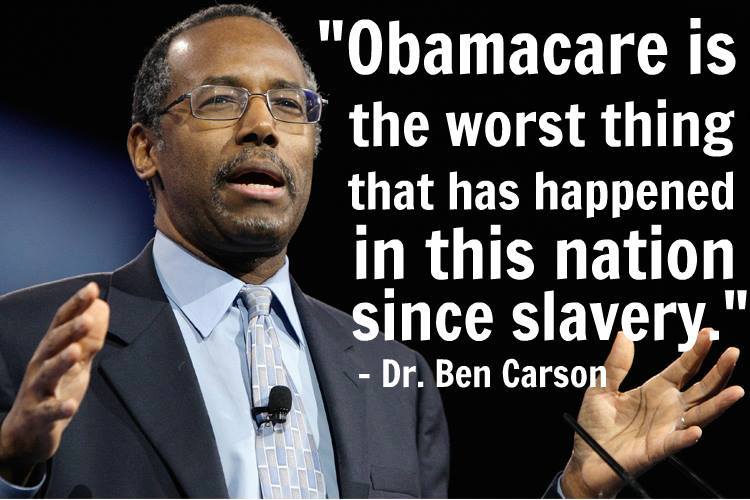
Alan: As seen in the above quotation, Ben Carson is much more powerful when he sticks to the facts.
Ben Carson defended his long-told story of a "scholarship" to West Point today, responding to scrutiny by saying that he merely had received an "informal" offer of a free ride to the military academy.
"Because I had done so extraordinarily well you know I was told that someone like me [could] get a scholarship to West Point," Carson told the New York Times. "It was, you know, an informal ‘with a record like yours we could easily get you a scholarship to West Point.'"


What Second Amendment Evangelists Fail To Understand About Their Opposition
Allies of the former neurosurgeon, who has slowly risen to the top of 2016 Republican primary polls, had been making a similar case all day. The argument -- which depends on a careful parsing of verbs -- is that he never applied, even after being told he'd be a sure-thing candidate. The point, which found many takers in conservative media, was that the controversy could be dismissed as a witch hunt.
That reasoning came together Friday morning, after Politico published a story titled "Ben Carson admits fabricating West Point scholarship." After confirming that Carson had never applied to West Point, and that a meeting Carson described with Gen. William Westmoreland apparently did not happen when the candidate had claimed, the story quoted Carson campaign manager Barry Bennett's new explanation.
"He was introduced to folks from West Point by his ROTC Supervisors,” Bennett said. “They told him they could help him get an appointment based on his grades and performance in ROTC. He considered it but in the end did not seek admission.”
West Point cadets must be sponsored by a member of Congress or the Secretary of the Army. But Doug Watts, a spokesman for the campaign, said that Carson never completed -- nor claimed to have completed -- the process for acceptance into West Point, and those never had an official sponsor.
"He was told by the ROTC Commander that he could have an appointment," explained Watts. "Dr. Carson rejected the offer, did not apply or pursue admission. Had he done so, and been accepted, that would have been tantamount to a scholarship, the same that all cadets receive."
In an interview, Carson's close friend Armstrong Williams argued that Politico had written a false headline off of Bennett's accurate quote.
"In the story itself, the campaign does not say Dr. Carson applied to West Point," Williams said of Politico. "Dr. Carson boasts about his scores in ROTC. Westmoreland encourages him to apply. As Dr. Carson says, they were impressed by his scores, but he never applied. They said to him, we could get you in. This guy got into Yale -- obviously he could have got in. The headline was a fabrication."
Carson, whose steady rise to the top of presidential primary polls has started to draw media scrutiny his way, is depending on a loose interpretation of the word "scholarship." There is no tuition at West Point; there is no equivalent of a "scholarship" as generally understood at most universities. In his memoir "Gifted Hands" and in anecdotes about the offer, Carson never says that he "applied," only that some "scholarship" came his way after a meeting with Westmoreland and "congressional medal winners."
"I was offered a full scholarship to West Point," Carson wrote. "I didn't refuse the scholarship outright, but I let them know that a military career wasn't where I saw myself going. As overjoyed as I felt to be offered such a scholarship, I wasn't really tempted. The scholarship would have obligated me to spend four years in military service after I finished college, precluding my chances to go on to medical school."
That description of the offer came with its own problems -- it is not, for example, impossible for a West Point graduate to complete his service, then become a doctor. But Carson's allies insist that the gap between "applying" and being offered a "scholarship" debunks the Politico story. Indeed, in "Gifted Hands," Carson repeatedly described how he had only $10 to submit with a college application, limiting his choices.
"Each college required a ten-dollar non-returnable entrance fee sent with the application," Carson wrote. "I had exactly ten dollars, so I could apply only to one."
In an August 2015 Facebook post, Carson described that situation again, to tell a questioner that he applied only to Yale.
"I was the highest student ROTC member in Detroit and was thrilled to get an offer from West Point," wrote Carson. "But I knew medicine is what I wanted to do. So I applied to only one school. (It was all the money I had). I applied to Yale and thank God they accepted me."
Williams, who had not spoken to Carson since Politico's story went online, insisted that it was "shoddy journalism" and oversold what Carson himself had claimed.
"It gives journalism a bad name," said Williams. "It only fits into Dr. Carson's narrative of a witch hunt."
On Friday afternoon, conservative talkers like Rush Limbaugh, Hugh Hewitt, and Sean Hannity criticized the coverage that had made Carson out as a dissembler. But at least one of his rivals sense a political opportunity in the scrum.
"Well, I think it’s really the beginning of the end," said Donald Trump in an interview.
David Fahrenthold and Robert Costa contributed reporting.
David Weigel is a national political correspondent covering the 2016 election and ideological movements.
No comments:
Post a Comment